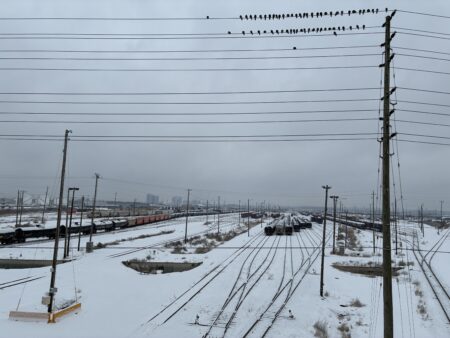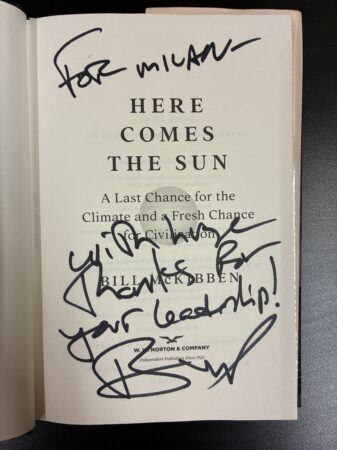Hopeful messages from McKibben
Permeated
There is literally grief in every part of me:
grief at the ends of the longest of the long hairs on my head;
in my scalp and cranium and brain and spine and torso.
Grief in the ribs enclosing my heart and lungs.
Grief all through the tract of my digestion.
From my nostrils and my mouth down my respiratory tree, carrying away carbon as I exhale
Dripping into my ear canals like hot wax, and into my nostrils as though suspended inverted.
Grief sitting present heavily in my mouth. Making me think of root canals. Of bone cancer.
Grief in the cumulative damages to toes and ankles from decades of walking and cycling;
In the way I trim and file my nails, how I treat them when they break unexpectedly: protecting the sensitive site, removing cracked fragments carefully and in their own time, medicating against infection, cleaning often, gloving and bandaging and Leukotaping
In the crest of grey emerging from temple to temple, punctuated by my widow’s peak
In the way I hear and feel the rain on my skin; how I smell it in the forest when the ground is sodden and the rain still falls. Thinking I’ve survived to this point. This is how this much heaviness feels.
In the way I think of the dead and the lost and the absent, and most wrenchingly on the yet-to-be-lost-but-doomed — the yet-to-suffer
There is grief in how I interpret a situation, a gesture, an implied motive, a social ambiguity or potential slight
In who I find that I can open up to and trust and let down the defences for and hold bare against my heart
350.org activities largely suspended in the US
Very sad news from Politico:
Environmental group 350.org, which spearheaded the movement to block the Keystone XL oil pipeline, will “temporarily suspend programming” in the U.S. and other countries amid funding woes, according to a letter obtained by POLITICO.
The move comes as environmental groups have struggled to find their footing and raise money under President Donald Trump, whose threats to investigate left-leaning organizations and rapid-fire dismantling of environmental rules have hamstrung green groups.
The letter to outside organizations from Executive Director Anne Jellema said 350.org had suffered a 25 percent drop in income for its 2025 and 2026 fiscal years, compelling it to halt operations. The group will keep three U.S. staff members in hopes of reviving operations in the future.
“In making these very tough choices, we considered a range of factors, including the political context, the relative need for 350’s work based on the strength of other actors in the ecosystem, the presence or absence of an enabling environment for civil society, and the ability to resource the work needed,” the letter said.
Climate change has never been more serious, and our leaders have never been more unserious about controlling it. It’s a disturbing time to see a group advocating for a better future be forced to cut back.
Open Process Manifesto
This document codifies and expresses some of my thinking on cooperation on complex problems, for the sake of the benefit of humanity and nature: Open Process Manifesto
It is based on the recognition of our universal fallibility, need to be comprehended, and to be able to share out tasks between people across space and time. To achieve those purposes, we need to be open about our reasoning and evidence, because that’s the way to treat others as intelligent partners who may be able to support the same cause through methods totally unknown and unavailable to you, across the world or centuries in the future.
Behind the FILLter
Prior to today, it never occurred to me to choose a name for my inner mind. My parents named me “Milan” and have been called it and thought of myself as it all my life; but, all my life, I have also felt a private interior domain where I enjoyed true freedom and privacy. The experience of the world through my senses turns naturally through the miracle of consciousness into thoughts and emotions which have the feeling of spontaneity and inherentness, of my true self calling out, of meshing my mind with this singular moment in time and space, passing a judgment about the world based on my knowledge and experience and inner voice.
Sarah Seager’s podcast episode with Martha Piper and Indira Samaraseka collided on my walk home with thoughts I have been having about being neurodiverse by choice: cultivating the informed ability to think differently from the societal norm or default, and it gave me the idea that my inner mind is an entity with a meaningful existence and worthy of naming to help mentally and emotionally distinguish it from my social self as it is interpreted and others wish it to be (“Milan”).
I am calling it FILL because it naturally and inescapably pervades me, and because when emotional I’m FILLed to overflowing. My natural sense desperately wants to be expressed, but it has learned from experience with parents and authority figures that its most natural impulses of feeling and telling the truth are often unwanted and must be suppressed, at least if they don’t fully correspond with the thoughts and feelings of the authority figure. A lifetime of punishment for feeling authentically and telling the truth have deeply internalized that all social action must be strategic and considered for impact on others – a perpetual mental burden of having to model and estimate the minds of others to try to project what they want or would consider ‘normal’.
FILL fills me, but the boundary at my skin is hard and there is vacuum outside. The boundary must always be guarded, so “Milan” as perceived from the outside can sufficiently correspond with the expectations of those with authority to be able to endure in life where power is often arbitrary and unfeeling, and where many prefer comfortable delusion to evidence-based reasoning.
I am going to put some thought into how my lifetime of relationships might be re-interpreted via the Milan/FILL distinction. I can immediately tell intuitively who in my sphere of present acquaintances nourishes, celebrates, and respects FILL and those who would rather erase the most fundamental parts of my whole existence – how I respond to the unfolding symphony of the universe, and my efforts to make sense of it with others – and have a “Milan” who follows their ideal script most closely. Of course, people’s whole lives don’t fall into one category or another. Your choices determine your alignment, your alignment does not determine your choices – and all of our behaviour makes more sense to judge than our character, which is multifaceted, contradictory, and complex.
Anyhow, consider naming your inner self and thinking about what the dialog between that entity and your social self as perceived as others might be. When is your FILL cheering for you, and when is it cringing with instantaneous regret while you are making a choice which you know morally compromises you? The freedom to be yourself inside your own mind is the only thing only incapacity and death can take from you, and when we listen to ourselves our instincts are generally to be humane and work to show empathy and understanding.
Our entry into Lyra’s world
I have long considered the opening chapter of Philip Pullman’s The Golden Compass to be a masterful lesson in worldbuilding in speculative fiction. He does a magnificent job of introducing a subtly different alternative world, without ever relying on crude exposition or just telling the reader that some things are different and what they are. The biggest obvious difference with our world — that the people in hers have daemons — is revealed unobtrusively and naturally from the perspective of characters who consider it normal. We learn everything crucial about Lyra’s bond with Pantalaimon just from the character of their conversation in this short timespan.
Yesterday, during a discussion with ChatGPT about Lyra Bellaqua and Sherlock Holmes, I had the assisted realization that what the chapter also achieves, even more importantly, is to establish Lyra’s character through the same method of compelling and unobtrusive narrative storytelling. When we meet her, she is conniving to sneak in to the exclusive Retiring Room for Jordan College scholars, which is forbidden to her, driven by her consuming curiosity about what happens there. Right away, we see that she is inquisitive and bold, willing to defy the rules to learn, and unwilling to defer to stuffy authority. Then, when she observes the Master’s attempt to poison Lord Asriel’s wine, her choice is to intervene: revealing the fundamental moral framework that drives her. Even at a risk to herself, she will make a substantial effort to save someone else, as later revealed at a much grander scale with her Bolvangar rescue.
It is said that all speculative fiction is really a commentary on the present, and Pullman’s is sharp and relevant. The Golden Compass reveals the monstrosities that emerge from the unchecked power of the heartless, and presents selfless individual moral courage as a response. Comfortable and exclusionary systems of power which are free from outside oversight drift into seeing right and wrong in terms of their self-interest, if they even persist with thinking about morality at all. Lyra reminds us that, while it is never safe, we always have the choice to resist and to assert a standard of morality based on respect for the individual and repugnance at their exploitation and sacrifice for outside agendas. The arc of that demonstration all begins with the insight into her mind provided by that opening chapter, and that’s why it stands out as some of the strongest worldbuilding in fiction.
Ontario may remove rent control
Terrifying news: the Ontario government wants to make it easy for landlords to evict tenants at will.
It’s stuff like this that makes the future terrible to contemplate. The system is already horrendously abused by landlords. Housing stress has been one of the worst parts of my life ever since I moved here. Policy choices like these understandably make people afraid about whether they will be able to have a future at all.




